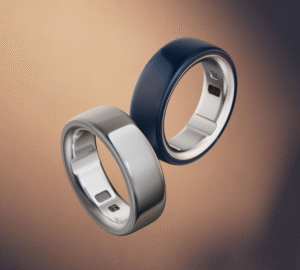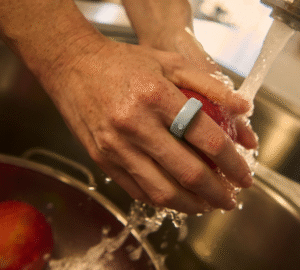We’re thrilled to welcome Dr. Kiarra King, MD, a board-certified OB-GYN, to Oura’s medical advisory board. In addition to being a skilled physician and surgeon, King is an advocate for healthcare equity and shares her expert advice on Instagram with an audience of more than 60,000 followers.
A passionate women’s health advocate, King is excited to bring her expertise to Oura, where she will be advising multiple teams on topics like pregnancy, menopause, and more.
Read on to learn more about her chosen field and what sparked her enthusiasm for women’s health.
What brought you to Oura?
It’s a funny story. I’m a huge fashion lover and was getting dressed for a fancy event where I’d spend the night dancing. I wanted to use a wearable to track my steps, but I didn’t have one to go with my outfit! A few weeks later, I was introduced to Oura, which turned out to be the fashion-forward, sleek wearable I was searching for — so it was very serendipitous!
The more I learned about Oura, the more passionate I became about it. A lot of Oura’s features and messaging aligned with my interests and what I naturally shared on my platform. For example, the Cycle Insights feature is so empowering for women — it’s so helpful to have that kind of data and insights on their hormonal cycle.
READ MORE: How Oura Data Can Help You Understand Your Menstrual Cycle
Tell us about your background. Why did you decide to specialize in women’s health?
After trying out a couple of different clinical rotations at medical school, I realized that obstetrics and gynecology was for me. I loved working with women, particularly during momentous occasions, like pregnancy or labor and delivery. It’s deeply fulfilling to help women transition into parenthood and other vital life stages.
During these phases, women enter into the unknown, particularly first-time mothers. They can be nervous and need a lot of reassurance because everything is unfamiliar. I want to be a provider that my patients trust and one who is willing to guide them, listen to them, and support them.
What types of obstacles do you see women facing in healthcare?
There are many! Often, women don’t – or can’t – find a provider who listens to them, so new journeys like pregnancy can end up feeling very isolating.
Beyond this, the black maternal mortality rate is excessive. Women, particularly black women, are often ignored or not truly listened to in medical settings and therefore have more complications. For instance, I am aware of a new mother from an internet group who passed away from postpartum preeclampsia. That should not be happening.
There’s a lot of education that needs to be done, particularly in communities where the quality of care, across the board, is not very high. I wish more women had a basic understanding of their anatomy and how their bodies work. It’s no fault of their own, and their access to care can be limited for a myriad of reasons. Simple things, like knowing your fertile window, can have a huge impact, particularly if you are actively trying to plan or prevent pregnancy.
Education is empowerment, and that’s one of the key goals of my platform, and it aligns with Oura’s commitment to women’s health too.
How can women benefit from using Oura?
Oura is an educational tool. The app gives you detailed insights into your menstrual cycle, like when you’re going to get your period and which phase you’re in. There’s more information on the blog, which is a resource I often refer to, to better understand each metric.
For instance, the article on how to sync your workouts with your cycle can really empower women. It doesn’t mean every woman needs to cycle sync, but it might be something you’ve never considered, and it may benefit you.
I personally like to know what is going on with my body overall, and Oura has been a useful tool. Whether it’s seeing my heart rate or my daily temperature trend readings, Oura has helped me develop a general awareness of my body.
One of my favorite Oura features is activity tracking. Oura provides metrics that show how much, and how often, I’m moving. I had recently set the goal to be more active, and Oura’s inactivity alerts, automatic activity detection, and step count features have really helped. Interestingly, my resting heart rate has decreased since I’ve become more active – which motivates me to keep it up!
LEARN MORE: What Is the Average Resting Heart Rate
| Member Tip: In the Oura App, you can personalize your Activity Goal, and you can choose a daily step target instead of a daily calorie burn target. |
Rapid-Fire Round
Must-do morning ritual?
I do a devotional every morning.
Bedtime routine for good sleep?
I’m a night owl, so I usually edit content until late, then shower, do my skincare routine, and get into bed around midnight.
One habit Oura has helped you with?
It keeps me accountable to be active.
Tip to overcome a mid-afternoon energy slump?
I’m a very high-energy person, but when I have patients who ask this, I ask them to look at their sleep hygiene — are you getting enough sleep? If so, is it high-quality sleep? Beyond this, what are you doing to fill your cup? I firmly believe that even just doing small things, like making your favorite tea, can bring you joy and boost your energy.
Surprising side interest or hobby?
I describe myself as multi-passionate. I sing, I’m a photography enthusiast, I’m a digital content creator, I love organizing things… the list continues.











